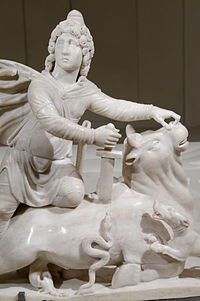Mithras
English

Etymology
Learned borrowing from Latin Mithras. Doublet of Mehr, mitre, and Mitra.
Proper noun
Mithras
- A Roman god, cult figure of the 2nd-to-4th-century Roman mystery religion known as the "Mysteries of Mithras" (now colloquially Mithraism)
Derived terms
Related terms
Latin
Etymology
Probably via Ancient Greek Μίθρας (Míthras) from some unattested Lua error in Module:parameters at line 360: Parameter 2 should be a valid language, etymology language or family code; the value "OIr." is not valid. See WT:LOL, WT:LOL/E and WT:LOF. intermediary, ultimately from vocative Avestan 𐬨𐬌𐬚𐬭𐬀 (miθra) (cf. Mithra).
Until the 1970s, the character of Roman Mithras was widely assumed to be a continuation of that of Iranian Mithra (and thus also of Indo-Iranian *mitra). This notion is no longer followed today, and it is generally agreed that borrowing (e.g. of the name) does not constitute continuation.
Pronunciation
- (Classical Latin) IPA(key): /ˈmi.tʰraːs/, [ˈmɪt̪ʰräːs̠]
- (modern Italianate Ecclesiastical) IPA(key): /ˈmi.tras/, [ˈmiːt̪räs]
Proper noun
Mithrās m sg (genitive Mithrae); first declension
- A Roman god, cult figure of the 2nd–4th century Roman mystery religion known as the "Mysteries of Mithras" (now colloquially Mithraism)
Declension
First-declension noun (masculine Greek-type with nominative singular in -ās), singular only.
| Case | Singular |
|---|---|
| Nominative | Mithrās |
| Genitive | Mithrae |
| Dative | Mithrae |
| Accusative | Mithrān |
| Ablative | Mithrā |
| Vocative | Mithrā |
References
- “Mithras”, in Charlton T. Lewis and Charles Short (1879) A Latin Dictionary, Oxford: Clarendon Press
- Mithras in Gaffiot, Félix (1934) Dictionnaire illustré latin-français, Hachette.
- English terms borrowed from Latin
- English learned borrowings from Latin
- English terms derived from Latin
- English doublets
- English lemmas
- English proper nouns
- English uncountable nouns
- en:Mithraism
- en:Roman deities
- Latin terms derived from Ancient Greek
- Latin terms derived from Avestan
- Latin 2-syllable words
- Latin terms with IPA pronunciation
- Latin lemmas
- Latin proper nouns
- Latin first declension nouns
- Latin masculine nouns in the first declension
- Latin masculine nouns
- la:Roman deities